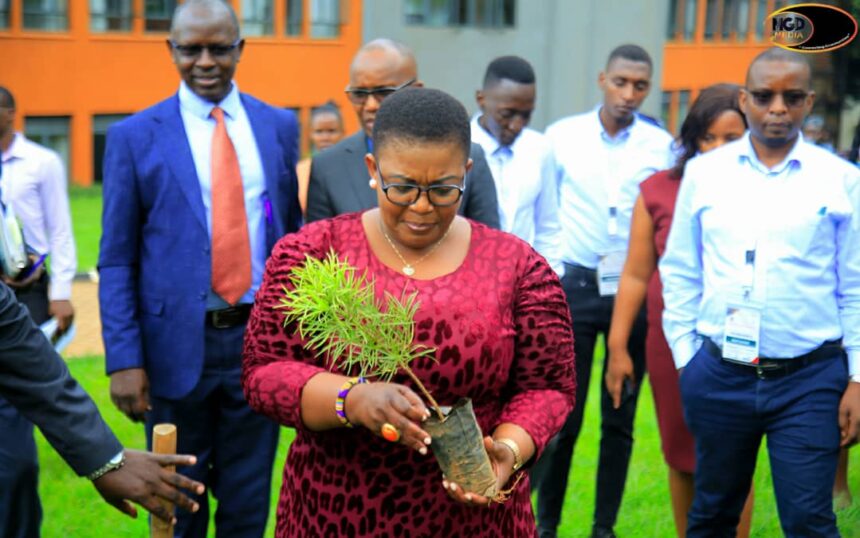Rt. Hon. Justine Kasule Lumumba, took center stage to spearhead series of events focused on environmental sustainability and national development. The minister’s remarks highlighted Uganda’s ongoing efforts to align with global and regional development goals, while introducing new policies aimed at bolstering research and evaluation within the country at the Uganda Evaluation Week held at Uganda Management Institute (UMI) on Tuseday 20th August, 2024.
The Minister for General Duties in office of prime minister Rt. Hon Justine Kasule Lumumba, led a significant tree-planting initiative at the Uganda Management Institute. This event, marking Day 2 of the 8th Uganda Evaluation Week, and was organized under the theme “Development with Purpose, Empowering Accountable Learning for Achieving Development Goals and Enhancing Climate Resilience.”
Addressing Journalists, government officials, environmentalists, and evaluation experts, Minister Lumumba outlined the critical importance of aligning Uganda’s National Strategic Plan with Vision 2040 and the Sustainable Development Goals (SDGs). “Our strategic plan is not just a roadmap but a commitment to transforming Uganda into a middle-income country,” Lumumba declared. “We are making progress, but there is still much work to be done to ensure sustainable wealth creation, employment, and inclusive growth.”
The event highlighted the minister’s focus on enhancing competitiveness and driving inclusive growth, core values of the SDGs. “Inclusive growth means leaving no one behind and reaching the furthest fast,” Lumumba stressed, referencing the SDGs’ guiding principle. “This is central to our agenda, and Uganda, as a signatory to these goals, is dedicated to achieving them by 2030.”
She also introduced a forthcoming policy requiring professionals to obtain a certificate or diploma in research monitoring and evaluation within a four-to-two-year period. “Evaluation is the backbone of accountability,” Lumumba stated. “This policy will ensure that our professionals are equipped to effectively assess and improve the policies that drive our national development.”
Amodi Martin Kigere, Director of the National Forest Authority, underscored the urgency of combating climate change, particularly for the nation’s most vulnerable populations. “The impacts of climate change are undeniable, especially for the poor,” Kigere said. “This is a challenge we must face together, not as individuals but as a united community.”
Dr. James Nkata, Director General of UMI, took the opportunity to express his concerns about the government’s underutilization of research produced by Ugandan institutions. “Our universities and institutes conduct extensive research on critical issues like environmental management,” Nkata noted. “Yet, this research is not being fully leveraged by the government. We stand ready to support national policies with our findings.”
Ms. Anne Nkutu, District Governor of Rotary District 9213, and Lubuulwa Mathew, President of the Uganda Evaluation Association. Both leaders echoed the need for collective action in addressing the challenges outlined during the week. “Evaluation is not just about assessing the past but shaping the future.
The events of the 8th Uganda Evaluation Week, highlighted underscore Uganda’s unwavering commitment to sustainable development and the critical role of accountability in national progress. As the nation continues to align its strategies with global and regional goals, the initiatives introduced ranging from environmental sustainability to professional development in research and evaluationsignal a forward-thinking approach to tackling the complex challenges ahead.

